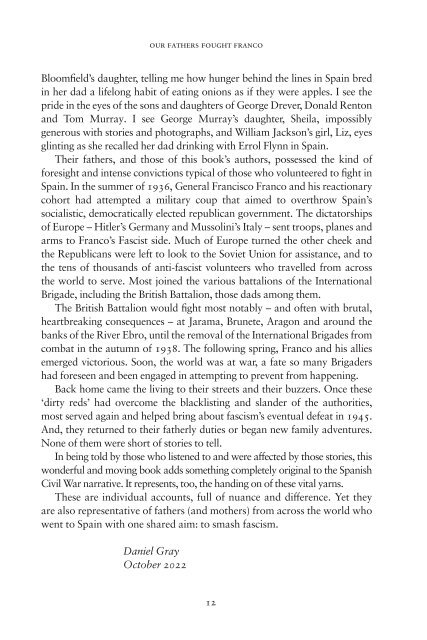Our Fathers Fought Franco by Willy Maley sampler
resonant piece of working class history, this book is a living link to four extraordinary stories. Why did these young men put their lives on the line and go to Spain to fight with the International Brigades? How did they all end up in the same prison cell? And what is their legacy today? James Maley, George Watters, Donald Renton and Archibald Williams were members of Machine Gun Company No. 2 of the XV International Brigade. This is the first book to focus on a small group of men who, from different starting-points, ended up on the same battleground at Jarama, and then in the same prisons after capture by Franco’s forces. Their remarkable story is told both in their own words and in the recollections of their sons and daughters, through a prison notebook, newspaper reports, stills cut from newsreels, interviews, anecdotes and memories, with a foreword by Daniel Gray. Our Fathers Fought Franco is a collective biography that promises to add significantly to the understanding of the motives of those who ‘went because their open eyes could see no other way’.
resonant piece of working class history, this book is a living link to four extraordinary stories. Why did these young men put their lives on the line and go to Spain to fight with the International Brigades? How did they all end up in the same prison cell? And what is their legacy today?
James Maley, George Watters, Donald Renton and Archibald Williams were members of Machine Gun Company No. 2 of the XV International Brigade. This is the first book to focus on a small group of men who, from different starting-points, ended up on the same battleground at Jarama, and then in the same prisons after capture by Franco’s forces.
Their remarkable story is told both in their own words and in the recollections of their sons and daughters, through a prison notebook, newspaper reports, stills cut from newsreels, interviews, anecdotes and memories, with a foreword by Daniel Gray.
Our Fathers Fought Franco is a collective biography that promises to add significantly to the understanding of the motives of those who ‘went because their open eyes could see no other way’.
Create successful ePaper yourself
Turn your PDF publications into a flip-book with our unique Google optimized e-Paper software.
<strong>Our</strong> <strong>Fathers</strong> <strong>Fought</strong> <strong>Franco</strong><br />
Bloomfield’s daughter, telling me how hunger behind the lines in Spain bred<br />
in her dad a lifelong habit of eating onions as if they were apples. I see the<br />
pride in the eyes of the sons and daughters of George Drever, Donald Renton<br />
and Tom Murray. I see George Murray’s daughter, Sheila, impossibly<br />
generous with stories and photographs, and William Jackson’s girl, Liz, eyes<br />
glinting as she recalled her dad drinking with Errol Flynn in Spain.<br />
Their fathers, and those of this book’s authors, possessed the kind of<br />
foresight and intense convictions typical of those who volunteered to fight in<br />
Spain. In the summer of 1936, General Francisco <strong>Franco</strong> and his reactionary<br />
cohort had attempted a military coup that aimed to overthrow Spain’s<br />
socialistic, democratically elected republican government. The dictatorships<br />
of Europe – Hitler’s Germany and Mussolini’s Italy – sent troops, planes and<br />
arms to <strong>Franco</strong>’s Fascist side. Much of Europe turned the other cheek and<br />
the Republicans were left to look to the Soviet Union for assistance, and to<br />
the tens of thousands of anti-fascist volunteers who travelled from across<br />
the world to serve. Most joined the various battalions of the International<br />
Brigade, including the British Battalion, those dads among them.<br />
The British Battalion would fight most notably – and often with brutal,<br />
heartbreaking consequences – at Jarama, Brunete, Aragon and around the<br />
banks of the River Ebro, until the removal of the International Brigades from<br />
combat in the autumn of 1938. The following spring, <strong>Franco</strong> and his allies<br />
emerged victorious. Soon, the world was at war, a fate so many Brigaders<br />
had foreseen and been engaged in attempting to prevent from happening.<br />
Back home came the living to their streets and their buzzers. Once these<br />
‘dirty reds’ had overcome the blacklisting and slander of the authorities,<br />
most served again and helped bring about fascism’s eventual defeat in 1945.<br />
And, they returned to their fatherly duties or began new family adventures.<br />
None of them were short of stories to tell.<br />
In being told <strong>by</strong> those who listened to and were affected <strong>by</strong> those stories, this<br />
wonderful and moving book adds something completely original to the Spanish<br />
Civil War narrative. It represents, too, the handing on of these vital yarns.<br />
These are individual accounts, full of nuance and difference. Yet they<br />
are also representative of fathers (and mothers) from across the world who<br />
went to Spain with one shared aim: to smash fascism.<br />
Daniel Gray<br />
October 2022<br />
12


















